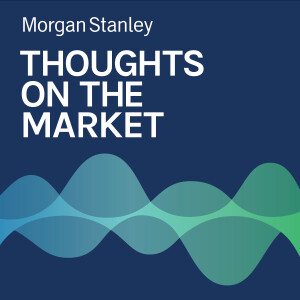
Andrew Sheets: November’s Early Holiday Gift to Investors
 2023-12-01
2023-12-01
The market rally of the last few weeks is based on strong economic data, suggesting that the U.S. and Europe remain on track for a “soft landing.”
----- Transcript -----
Welcome to Thoughts on the Market. I'm Andrew Sheets, Global Head of Corporate Credit Research for Morgan Stanley. Along with my colleagues bringing you a variety of perspectives, I'll be talking about trends across the global investment landscape and how we put those ideas together. It's Friday, December 1st at 2 p.m. in London.
November 2023 is now in the history books. It was outstanding. US bonds rose 4.5%, the best month since 1985. Global stocks rose 9%, the best month in three years. Spreads on an investment grade and high yield bonds tightened significantly. With the exception of commodities and Chinese stocks, which both struggled, November was an early holiday gift to investors of many stripes.
While the size of the rally in November was unusual, the direction didn't just spring from thin air. Generally speaking, economic data in November strongly endorsed the idea of a soft landing. Soft landing, where inflation falls without a sharp drop in economic activity are historically rare. But they are Morgan Stanley's economic forecast for the year ahead. And in November, investors unwrapped data suggesting the story remains on track.
In the US, core consumer price inflation declined more than expected. Core PCE inflation, a slightly different measure that the Federal Reserve prefers, has fallen down to an annualized pace of just 2.5% over the last six months. Gas prices are down 16% since the summer, rental inflation has stalled and the U.S. auto production is normalizing, improving the trend in three big drivers of the higher inflation we've seen over the last two years.
Go back 12 months and most forecasts, including our own, assume that lower inflation would be the result of higher interest rates driving a slowdown in growth. But the economy has been good. Over the last 12 months, the U.S. economy has grown 3%, .5% better than the average since 1990.
The story in Europe is a little different from the one in America, but it still rhymes. In Europe, recent inflation data has also come in lower than expected. While economic data has been somewhat weaker. Still, we see signs that the worst of Europe's economic growth will be confined to 2023 and continue to forecast the weakest growth right now, with somewhat better European growth in 2024.
Why does this matter? While the returns of November were unusual and unlikely to repeat, it's a good reminder not to overcomplicate things. Good data, by which we mean lower inflation and reasonable growth, is a good outcome that markets will reward, and remains the Morgan Stanley economic base case. Deviating on either variable is a risk, especially for an asset class like credit. Following the data and keeping an open mind, remains important.
Thanks for listening. Subscribe to Thoughts on the Market on Apple Podcasts or wherever you listen and leave us a review. We'd love to hear from you.
More Episodes
 2024-11-08
2024-11-08
 2024-11-07
2024-11-07
 2024-11-05
2024-11-05
 2024-11-01
2024-11-01
 2024-10-31
2024-10-31
 2024-10-30
2024-10-30
 2024-10-29
2024-10-29
 2024-10-28
2024-10-28
 2024-10-25
2024-10-25
 2024-10-23
2024-10-23
 2024-10-22
2024-10-22
 2024-10-15
2024-10-15
 2024-10-14
2024-10-14
Create your
podcast in
minutes
- Full-featured podcast site
- Unlimited storage and bandwidth
- Comprehensive podcast stats
- Distribute to Apple Podcasts, Spotify, and more
- Make money with your podcast
It is Free
- Privacy Policy
- Cookie Policy
- Terms of Use
- Consent Preferences
- Copyright © 2015-2024 Podbean.com




